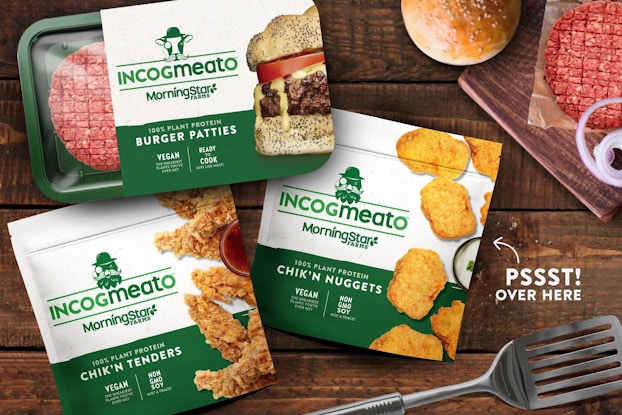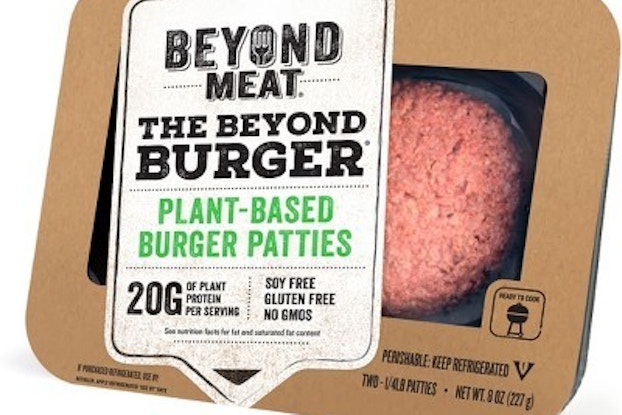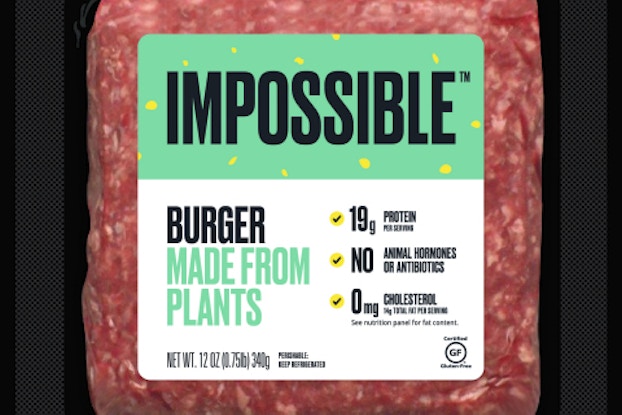
From beefless burgers and sirloin without the slaughterhouse to chickens hatched in a petri dish, faux meat is hot, and ‘big meat’ and ‘big food’ are stampeding into the plant-based and cell-based meat space with full force.
Bruce Freidrich, co-founder and executive director of the Good Food Institute (GFI), which held its second annual The Future of Meat conference in San Francisco in September, attributes the new interest in alternative meat from big meat and food companies to Beyond Meat’s phenomenal success on the stock market — its May 1, 2019 IPO was the largest in two decades, and its "P.L.T," meatless patty just test-launched at McDonald’s — and Impossible Foods, which sold so many of its Impossible Burgers when it debuted in 58 Burger King locations in April that it ran out of product.
Even though neither startup has yet to turn a profit, the two alternative meat companies clearly have the attention of the traditional meat and food giants like Tyson Foods, JBS, Smithfield Foods, Perdue Farms, Nestle, Kellogg Company, Hormel Foods and numerous others, along with grocery retail giant Kroger, which at the conference announced the launch of a full line of plant-based foods under its Simple Truth store brand, ranging from burgers to lunch meat.
“Kroger’s commitment to innovating and creating new plant-based foods mirrors the growing number of customers exploring meat and dairy alternatives,” said Nicole Davis, Kroger’s senior category strategy and innovation manager of Our Brands, in making the announcement. Kroger is the largest grocery chain in the U.S. and the second-largest retailer of groceries after Walmart.

In just the last six months, the animal-free meat segment — which comprises a mere 1% of the $20 billion U.S. meat business today — has gone from being a space mainly populated by well-funded startups to garnering the interest of a “who’s who” of big meat and big food companies.
While currently only plant-based alternative meat products are available in grocery stores and restaurants, up next is lab-grown meat, which is the next iteration of faux meat.
Healthy eating ‘flexitarians’ drive plant-based options
The big players in the food and meat industries are investing heavily in plant-based meat to keep step with the rise of startups like Beyond Meat, whose products are now in over 35,000 U.S. grocery stores, and Impossible Foods, which in September added grocery store sales to its existing foodservice business.
They’re also going where the growth is.
Although alternative meat currently represents a tiny blip on the U.S. meat business, sales of plant-based meat are rising faster than sales of regular meat. Research firm Nielsen says annual U.S. sales of plant-based meats jumped 42% between March 2016 and March 2019 to $888 million. Conversely, traditional meat sales rose only 1% to $85 billion in that same time frame.
Progress has been stunning, and I don’t think anything is more exciting than getting ‘Big Meat’ and ‘Big Food’ to invest in plant-based proteins and cultivated meat.Bruce Freidrich, co-founder and executive director, Good Food Institute
Reinvent
The alternative meat industry has risen in popularity through its reinvention of traditional food offerings, touting wellness benefits like sustainability and health. Find more sustainable business ideas here.
And the future looks bright. In its July 2019 Disruption at the Dinner Table report, UBS forecasts the plant-based meat market will grow by 28% a year and reach $85 billion by 2030, and they're suggesting that could be a conservative estimate.
Additionally, according to a team of Barclays’ analysts spanning the agriculture, food and restaurant industries, the market for alternative meat could reach $140 billion over the next decade. That rapid pace of growth positions the animal-free industry to capture an estimated 10% of the $1.4 trillion global meat industry.
“Progress has been stunning,” GFI’s Friedrich said at The Future of Meat conference, “and I don’t think anything is more exciting than getting ‘Big Meat’ and ‘Big Food’ to invest in plant-based proteins and cultivated meat.”
Growing demand for healthier, more sustainable food is one key reason people are seeking plant-based meats, Melanie Bartelme, a research analyst for consulting firm Mintel, told CO—. It’s also the main reason behind rising sales of oat milk, cauliflower pizza crust and even coconut oil-based makeup, she said.
Bartelme attributes the sales boom in plant-based meat not to vegans or vegetarians, which together make up only about 7% of eaters, but rather to “flexitarians,” who focus on eating healthy plant proteins and whole, minimally processed plant-based foods, but also eat meat and animal products in moderation.
“There’s a lot of messaging that plants are powerful. It feels like something that gives you a quick fix, something that’s really good for you,” she said, “and the growth isn’t going to slow down.”

Gil Phipps, Kroger’s vice president of Our Brands, cited flexitarians as key to the grocery giant’s decision to launch its line of plant-based meats.
“As more of our customers embrace a flexitarian lifestyle, choosing to prioritize healthier food choices and reduce their environmental footprint, we are excited to meet their needs with a remarkably delicious line of animal-free foods under our Simple Truth brand,” Phipps said at The Future of Meat conference.
The burgeoning ‘cultivated’ meat market
The next iteration in faux meat is what’s referred to as “lab-based,” “lab-grown,” “cultured,” “cell-based’ or “clean meat,” although if GFI has its way, the new universal term will be “cultivated meat.”
Cultivated meat is produced by in vitro cultivation of animal cells, instead of from slaughtered animals. It is a form of cellular agriculture. Cultured meat is produced using many of the same tissue engineering techniques traditionally used in regenerative medicine. To make cultured meat, scientists begin by taking a biopsy of animal muscle tissue. They then take stem cells from the tissue, multiply them exponentially and allow them to differentiate into fibers that bulk up and form muscle tissue.
No lab-based meat products are available yet in restaurants or grocery stores. But the major U.S. startups in the space such as JUST, Memphis Meats, Mosa Meat, and Fork and Goode all say they plan to introduce consumer-ready products in the near future.

These startups created much excitement at The Future of Meat conference and are also drawing the attention of the big food and meat companies. For example, Tyson Foods is an investor in lab-produced meat startups Memphis Meats and New Wave Foods, both based in California, and Israeli-based SuperMeat.
The jury is still out on the commercial viability of lab-based meat in terms of producing it for a reasonable price point, and whether it will garner consumer acceptance of the technology used to make it.
But that isn’t stopping the big meat and food companies from getting into the game, according to GFI’s Friedrich. The three-day The Future of Meat Conference, which he coordinated, drew as much interest in what he calls the cultivated meat space as it did for the already proven plant-based segment. Producers, big meat and food company representatives, scientists, entrepreneurs, investors and officials from foreign governments like Japan and Singapore all showed much optimism about the future of cultivated meat during the conference sessions and in the hallways of the hotel conference hall, he said.
The key selling proposition for cultivated meat is two-fold: It’s more environmentally sustainable than animal agriculture, and will help feed a growing global population in need of protein sources without the detrimental effects of animal agriculture, its proponents argue.
Taste and texture are also part of the argument vis-à-vis cultivated versus plant-based meat. Those touting cultivated meat say they can create animal-free meat that has the texture and taste of conventional meat, which is what some consumers say is lacking in plant-based meats, although trending products like Beyond Burger are changing that opinion.
Taste, along with what lab-based meat is ultimately called by consumers, is the final frontier when it comes to the future of cultivated meat, according to GFI’s Friedrich. “Not only must it taste, look and smell delicious, what it’s called matters to consumers, too.”
CO— aims to bring you inspiration from leading respected experts. However, before making any business decision, you should consult a professional who can advise you based on your individual situation.
CO—is committed to helping you start, run and grow your small business. Learn more about the benefits of small business membership in the U.S. Chamber of Commerce, here.

What can membership do for your business?
Gain tools to stay informed, competitive, and connected by becoming a U.S. Chamber of Commerce member. Membership gives you direct access to expert policy insights, economic updates, and exclusive resources designed to help your business thrive. From behind-the-scenes analysis from D.C. to exclusive discounts and expert support, U.S. Chamber membership helps you navigate change and seize new opportunities.







